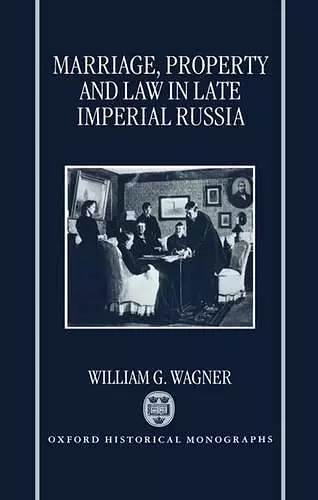Marriage, Property, and Law in Late Imperial Russia
Format:Hardback
Publisher:Oxford University Press
Published:13th Oct '94
Currently unavailable, and unfortunately no date known when it will be back

1995 Heldt Prize - Best Book in Slavonic Women's Studies - awarded by US Association for Women in Slavic Studies
This is the first systematic study of civil law in late Imperial Russia. It shows how efforts to reform the civil law provoked conflict within and between the state administration, the Orthodox Church, and society in general. It incorporates many sources only recently made available, and is an important contribution to the history of late Imperial Russia.This is the first systematic study of civil law in late Imperial Russia. It shows that efforts to adjust family, property, and inheritance law to changing social and economic conditions often became intertwined with attempts to shape society in accordance with competing ideological ideals. Through a restructuring of the family's legal basis, members of the growing educated and professional strata of society in particular endeavoured to promote conflicting coneptions of authority, individuality, gender, and law. Legal reform also served for members of the emerging legal and medical professions as a way to establish their authority, often at the expense of the state administration and the Orthodox Chruch. Civil law in late Imperial Russia therefore constituted both an important medium for ideological redefinition and a field of battle for those seeking to reform, to overthrow, or to defend the ancien regime. Because this battle extended into the state bureaucracy, legislative change proved extremely difficult. Newly empowered by the 1864 judicial reform, the judiciar responded to legislative inaction by not merely adapting the law, but also by promoting an ideal of the family whose values and principles challenged those underlying the autocracy. Professor Wagner's detailed and scholarly analysis of these issues offers many important insights into cultural attitudes and political structures in late Imperial Russia.
Of the precious few western historical works on late imperial Russian law, this one is by all odds the best...this work achieves two noteworthy accomplishments: it places Russia in the context of nineteenth-century European civil law reform and it allows for a better understanding of the Soviet civil law system which followed...Wagner's examination of imperial law provides a partial corrective to the historical construct of a break in Russian legal development; by so doing, he contributes to a clarification of Soviet law's place in legal history. * Slavic Review *
Wiliam Wagner has written a highly detailed analysis of the debates over the revision of family and property law from the eve of the Great Reforms to 1917. * Yanni Kotsonis, New York University, The Russian Review *
this is an important contribution to the study of Russian law, to the subject of women's rights and to the vital topic of why reform in tsarist Russia was so difficult to achieve. * Revolutionary Russia *
Without any doubt Professor Wagner's work can be recognised as an important contribution to knowledge of Russian private law after the reforms of the 1860's-70s. The results of his extensive research are of real interest, not only for foreign academics, but for Russian scholars as well ... the author accomplishes a very good analysis of the attempts to revise Russian private law ... Professor Wagner has managed to write a book on Russian law of a quality that is, alas, uncommon even for modern Russian researchers. His work constitutes not only a sophisticated and complete study of two interesting legal topics, but also gives a previous insight into the social and political life of post-reform Imperial Russia. * Maria Antokolskaya, Moscow State Law Academy, Legal History *
In a monograph which is likely to remain the standard work on the subject, William Wagner traces the impact of an emerging legal consciousness on family and property law ... impressive monograph ... Wagner's book is clearly structured and closely argued, and rests upon a superb knowledge of contemporary legal argument. It represents a major contribution to the history of late Imperial Russia. * Peter Gatrell, University of Manchester, The Slavonic and East European Review, Vol. 74, No. 3 *
detailed and richly documented examination ... a welcome addition to the Western historiography of the development of a civil society in late imperial Russia ... scholars and advanced graduate students will find in it much useful information about Russian jurists and the workings of the Civil Cassation Department. * Christine D. Worobec, Kent State University, American Historical Review, June 1996 *
among the most significant books on pre-revolutionary Russia to appear in the last decade ... It is a richly documented, finely nuanced, and conceptually bold study of conflict over civil law, and it adds a whole new dimension to recent studies of the late Tsarist state. * Edward Acton, University of East Anglia, EHR Apr. 97 *
This work gives the reader excellent insights into the overall discussions of change in late-nineteenth- and early-twentieth-century Russia and can be viewed as a metaphor for the ambivalence of tsarist society to reform itself. * Norma C. Noonan, Augsburg College, History, Winter 1996 *
- Winner of 1995 Heldt Prize - Best Book in Slavonic Women's Studies - awarded by US Association for Women in Slavic Studies.
ISBN: 9780198204473
Dimensions: 223mm x 146mm x 31mm
Weight: 651g
428 pages